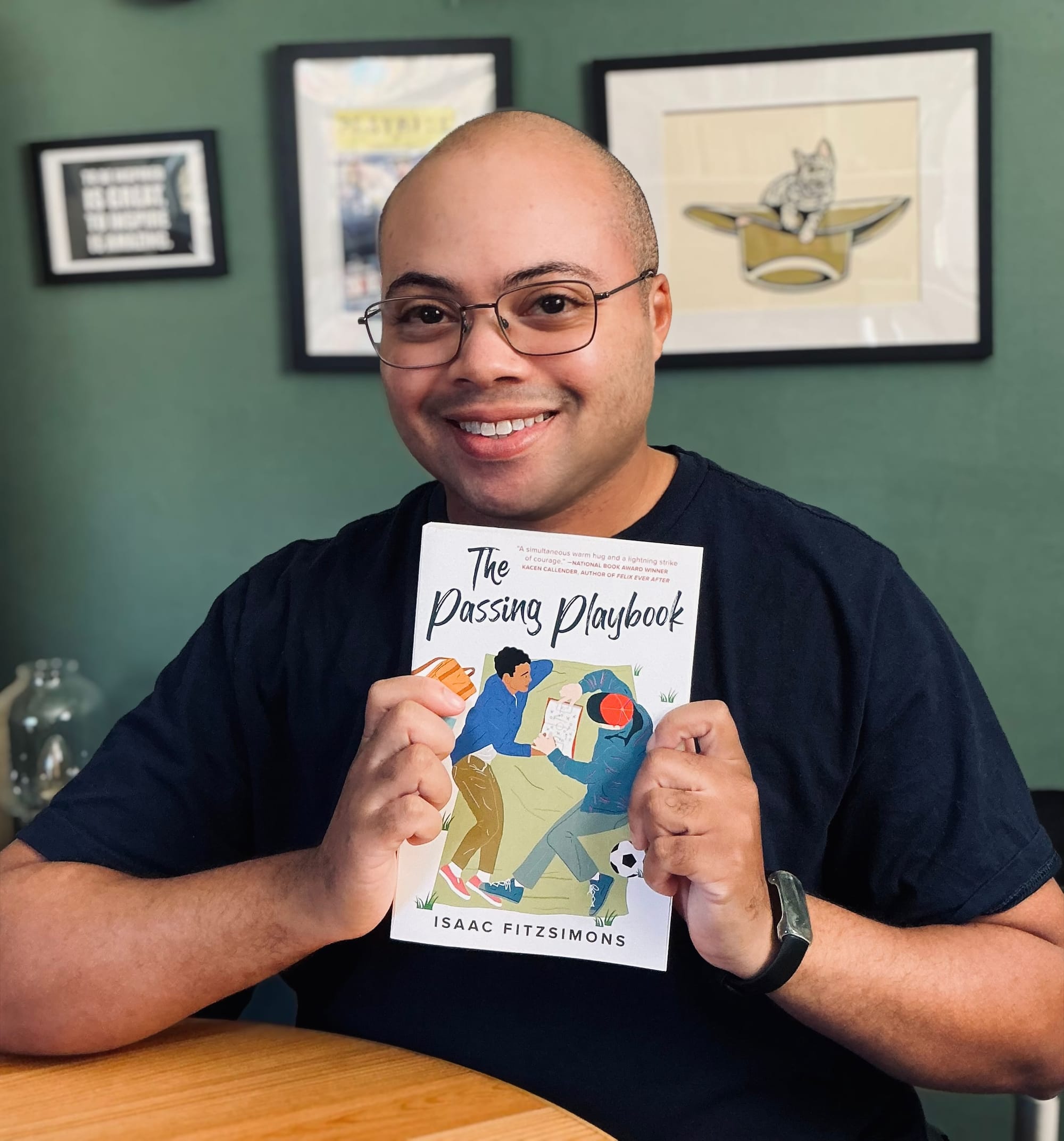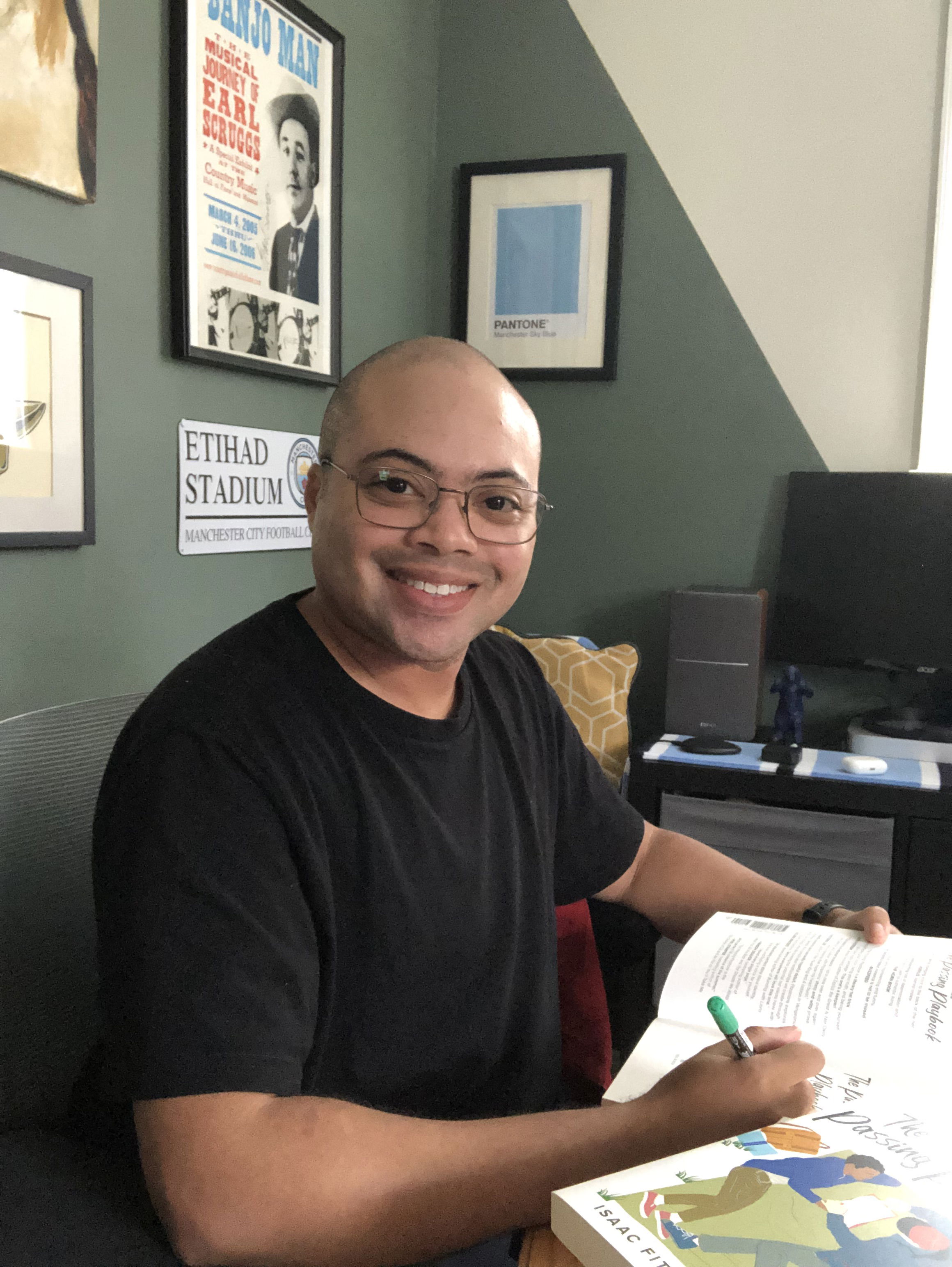Building Worlds with Heart: An Interview with Isaac Fitzsimons, Author of The Passing Playbook

I recently had the pleasure of interviewing Isaac Fitzsimons, author of The Passing Playbook, which has quickly become one of my favourites. I was captivated by Spencer's heartwarming family bonds, supportive friendships, and deeply relatable journey. In this interview, Isaac shares insights into his writing process, the inspiration behind The Passing Playbook, and his path to becoming a published author.
Isaac's passion for storytelling shines through from writing his first story, The Vampire Rabbit, at just six years old to his recent accomplishments. He discusses the moments that have shaped his journey, including his participation in the renowned Pitch Wars program, which led to the creation of The Passing Playbook. Isaac also opens up about his unique writing routine, approach to crafting dynamic characters, and how his love of thrillers influences his reading habits.
What struck me most during our conversation was Isaac's commitment to portraying trans people as valued individuals loved and supported by their families and friends. I firmly believe that every human being has the right to live equally within society. To create a truly harmonious and beautiful community, we must respect, support, and embrace each person for who they are, without conditions or judgment. In a time when trans issues often become politicized, Isaac’s writing brings a refreshing and compassionate perspective.
In this interview, Isaac also gives us a glimpse of his upcoming projects, including a middle-grade historical fantasy and a YA romance that fans will surely be eager to dive into. As a reader, I am already looking forward to his next releases in 2025.
Join me as we explore Isaac’s world of writing, from his creative inspirations to his thoughtful advice for aspiring authors.
1. Could you share a bit about your journey as a writer? What inspired you to start writing, and what keeps you motivated?
A. When I was six, I wrote a story called The Vampire Rabbit, inspired by a book series called Bunnicula (picture attached), so I’ve always loved writing. It wasn’t until my twenties that I began exploring the idea of becoming a published author. Through my research, I learned about an online program called Pitch Wars, which paired new writers with more experienced ones to help edit their books. After a few years of watching the program from the sidelines, I finally entered The Passing Playbook and was chosen. What keeps me going is getting to create an entire world in my mind and bring it to life for other people. In that way, writing is a bit like magic.

2. Every writer has a unique process. Could you describe your writing routine? Do you follow specific rituals or habits while working on a new book?
A. Over the past few years, I’ve developed an 8-step writing process that I revisit frequently and adjust as needed. It started as a way to help me document how I work best because I found that by the time I finished one book and started on another, it was as if I had forgotten how to write. Now, when I get stuck, I can check my writing process, and it helps get me back on the right track. Basically, I start with a brain dump in the notes app on my phone, which eventually migrates to Google Docs. I then go through four stages of outlining, two stages of drafting, and two stages of revision, with additional revisions between each stage.
As for habits, I try not to be too rigid when it comes to my actual writing sessions. Some days it can be hard to open the document, and I find that needing certain things in the environment, like a special pen or the perfect playlist, can just lead to procrastination. At this point, when I’m drafting, I’m able to settle down and get what I need to accomplish in a few hours.
3.How did the idea for ‘The Passing Playbook’ come to you? Was there a particular moment or experience that sparked its creation?
A. Yes! I was listening to a radio program on the BBC where people share stories about how a particular song impacted their lives. A man came on and told a story about his time at a military academy when another student taught him how to play Elvis Presley’s “Can’t Help Falling in Love,” which he later played for his future wife on their first date. I remember being moved by the idea of a boy teaching another boy how to play a love song on guitar, and that became the inspiration for Spencer and Justice.
4. Your characters feel so alive and relatable. How do you go about developing such dynamic and memorable characters?
A. Funnily enough, I don’t do major character work before I start writing. When I’m creating characters, I tend to think in terms of relationships and how different characters relate to each other, because that says so much about who they are. I develop characters by putting them in a scene and seeing how they act. I find that secondary characters come much easier to me than main ones. Much of the work I do in the drafting and revision stages is pruning, where I drill into what makes each character tick and then make sure that it’s consistent throughout the book.
5. Do you have a favorite character from your own works? If so, what makes them special to you?
A. I’m quite partial to Theo. I love how unfiltered he is. He says the things that I’m thinking but can’t say because it wouldn’t be appropriate!
6. Many readers loved your books' themes of family and friendship. How important are these themes to your writing, and what message do you hope readers take away?
A. Unfortunately, in our current political climate, trans issues have been severely weaponized. So, it was important for me to portray trans people as individuals who have family and friends who love and support them. I want readers who are trans to see that they are worthy of being loved. And I want non-trans readers to see that families with trans kids are just like theirs.
7. Writing compelling dialogue is an art. What’s your approach to writing authentic, engaging dialogue between characters?
A. I really enjoy writing dialogue. In fact, it’s usually the first thing I draft. Something that I’ve learned is to make sure that there are layers to it. In real life, we rarely say exactly what we’re thinking, so our characters shouldn’t either.
8. How do you handle writer’s block or moments of self-doubt during the creative process?
A. I view writer’s block as a symptom that something isn’t working. Sometimes it’s related to my body: I’m tired, I need to eat, my chair is uncomfortable. Other times, it’s related to the story I’m working on. If I miss my writing goal several days in a row, then I pause what I’m doing and try to diagnose the problem through experiments. I’ll try timed sprints or word sprints, only writing dialogue, only writing blocking, etc. I just do whatever I can to keep the momentum going, even if it means adjusting my goal.
9. When you’re not writing, what do you enjoy reading? Do you have any favourite genres or authors?
A. Lately, I’ve been getting my reading in while walking on the treadmill. I’m very much a mood reader and go through phases in terms of preferred genres. But I always love thrillers. If there’s a picture of a dark house with one window lit up on the cover, then I’ll read it. My all-time favourite book is Warlight by Michael Ondaatje. I also love the Beartown series by Fredrik Backman (though I haven’t read the last one because I know it’s sad).
10. Your readers adore your book. How do you stay connected with your audience, and how does their feedback impact your writing?
A. I am absolutely horrible at social media! Text-based platforms move too quickly for me, and I’m just not a very visual person. I’m hoping to start doing more and have links to my profiles on my website (www.isaacfitzbooks). I don’t purposely search for feedback, but I do love hearing from readers if they enjoyed my book, and I read every email, even if it takes me forever to respond.
11. Have you ever included elements of your personal life or experiences in your stories? If so, can you share an example?
A. One of my favourite scenes from The Passing Playbook, the Trans Day of Remembrance scene, is taken from a real-life experience. I won’t spoil it for readers, but it gives me chills whenever I’ve re-read it.
12. What’s the most challenging aspect of writing in today’s publishing landscape, and how do you overcome those challenges?
A. I think the expectation for authors to churn out a book a year is challenging for me because that’s simply not my pace. When you don’t have a book out, it’s easy to feel behind compared to others. I remind myself that there’s no timeline for having a successful writing career and just try to carry on at the pace that works best for me.
13. Looking ahead, are there any new projects you’re working on or ideas you’re excited to explore in future books?
A. I have a personal essay in an upcoming middle-grade anthology called 'Athlete is Agender', which comes out on May 13, 2025. As for other projects, I can’t give specifics, but I have a middle-grade historical fantasy that I’m really excited about. I’m also working on another YA romance that’s 'The Bear meets The Breakfast Club'.
14. How do you unwind after finishing a book or meeting a significant writing milestone?
A. After meeting a deadline, I force myself to take the next week off from writing. During this time, I’ll catch up on TV or movies. I also play The Sims and will generally start a new save, play nonstop for days, and then not touch it again for months.
15. Lastly, Share some advice for aspiring authors. What advice would you give to your younger self?
A. Don’t expect to be able to perfectly transfer the idea in your head onto the page in your first draft. Write in layers. Your goal should be to get to the end. Only then can you fix it.
From The Passing Playbook to his exciting upcoming projects, Isaac’s journey as a writer continues to inspire. And with his new books set to release in 2025, the anticipation for his forthcoming works has already begun!
As you venture into future literary endeavours, please accept my best wishes. I am confident that your unique perspective and storytelling prowess will continue to enthral and impact readers, just as it has for me. Your contributions to the literary world will continue to leave an indelible mark.
Once again, I want to express my deep appreciation for your invaluable insights and graciously dedicating your time to engage in this enlightening conversation. Thank you, Isaac. We can’t wait to see what magic you create next!

Connect With Author Isaac Fitzsimons:
Instagram: https://www.instagram.com/isaacfitzbooks/
Website: https://www.isaacfitzbooks.com/
Linktree: https://linktr.ee/isaacfitzbooks
Click here for the review of "The Passing Playbook"


